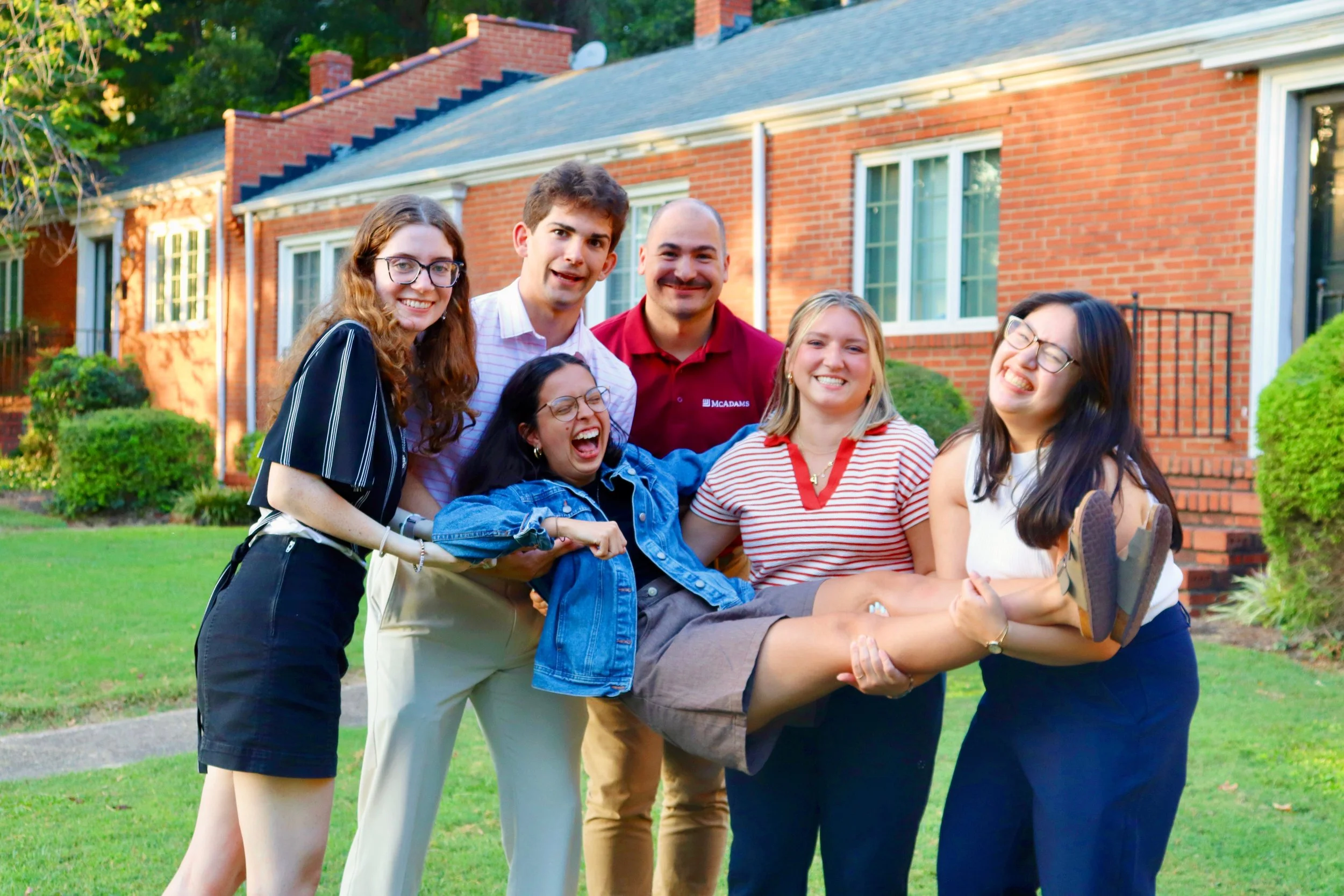The following post comes from Dr. R. Albert Mohler Jr.'s popular podcast The Briefing, a daily analysis of news and events from a Christian worldview.
The Gospel Changes Everything: 3 Takeaways from My Time as a Charlotte Fellow
In nothing has the Church so lost Her hold on reality as Her failure to understand and respect the secular vocation. She has allowed work and religion to become separate departments, and is astonished to find that, as a result, the secular work of the world is turned to purely selfish and destructive ends, and that the greater part of the world’s intelligent workers have become irreligious or at least uninterested in religion…. But is it astonishing? How can anyone remain interested in a religion which seems to have no concern with nine-tenths of his life?
-Dorothy Sayers
I came across this quote by Dorothy Sayers in a sermon by Dr. Timothy Keller and believe it highlights some of the misconceptions we often hold about work. During my year as a Charlotte Fellow I began to see the way these errors played out in my own life and understand how the Gospel of grace totally transforms our understanding of vocation.
Great Expectations: A Message from New Charlotte Fellows Director Connice Dyar
I’ve always liked the beginning of fall. It’s always given me a feeling of expectancy: New school year, new classes, new people, new school supplies. There was something so exciting about a brand new notebook with all the clean pages and new pencils. It just felt like a fresh start, like anything could happen.
Charlotte Fellows Spring Update
The Charlotte Fellows have had a very eventful spring semester. Here are a few highlights:
1. Gifting, calling, vocation seminar: Dr. Bill Fullilove of Reformed Theological Seminary Atlanta led a two-day seminar on calling, gifting, and vocation. Dr. Fullilove taught on the theology of vocation, helped the Fellows interpret their results from the Highlands Ability Battery, and addressed practical hurdles that recent college graduates face in seeking full-time employment. In preparation for this weekend, the Fellows drafted work mission statements, addressing how their talents, shortcomings, interests, personality type, and relating style might come together in full-time employment. From the Fellows:
"The workshop helped me to clearly define (in normal, everyday language) my gifts/abilities, the kinds of roles I can fill in an organization, my core vocational values, and my short/long term career goals."
2. Hope for the Inner City Chattanooga: The Fellows traveled to Chattanooga, TN last month for a week of living, learning, and working in cross-cultural ministry in the inner city. Hope is a non-profit birthed from New City Fellowship Church (PCA), a church made up of Caucasian, African American, and Hispanic believers from every part of the socio-economic spectrum. Fellows put on Bible clubs for neighborhood kids and worked alongside a man and his family to renovate their new home and help them move. The Fellows also participated in conversations on racial reconciliation, learning how to recognize and confront fears and biases toward brothers and sisters in Christ from different cultures. From the Fellows:
"Our time at Hope for the Inner City was one of my favorite parts of the Charlotte Fellows. We formed relationships, heard testimonies, shared the Gospel, shared meals, and worked hard for others. Our friends there taught us, by word and example, to embrace conflict, serve selflessly, and love generously. I'm so thankful for the opportunity to travel to Chattanooga not only for what it taught me about poverty and the church, but also for the chance to grow in even deeper community as brothers and sisters in Christ."
"The week was a chance to give undivided attention to the idea of racial reconciliation, and to face the cynicism and bias that has gone unchecked in my heart."
"I saw God destroy fear and replace it with compassion."
3. The Gospel and dating relationships: We are in the midst of an ongoing discussion on dating and marriage, and God is bringing many fears and insecurities to light -- some for the first time. Fellows are asking questions like these:
- What if someone gets to know me really well and then rejects me?
- Does lack of romantic interest in me thus far mean that I am undesirable?
- What if I don't have what it takes to commit and fight through the tough times with someone?
- What if my marriage is destined to end in divorce like my parents' marriage?
- What if my marriage fails to measure up to my parents' marriage?
- How do you really get to know someone after college?
As the Fellows learn to believe and apply God's Word and build relationships with host families, mentors, and other friends of the program, they are experiencing freedom in Christ from fear, shame, and insecurity in relationships.
Thank you for you prayers and support!
Making Our Wildest Dreams Come True?
Beyond meeting basic needs, what motivates you to work? Is there a level of personal wealth are you striving to attain? What will happen when you get there? How will your life be different? What you are working for reveals what you believe about God. Nothing has more direct impact on your day-to-day life than what you believe about God.
In Luke 12, Jesus is surrounded by thousands of people, all listening to him teach on matters of the utmost significance. At some point a man in the crowd interrupts Jesus, saying essentially, “All of this stuff about God is fascinating, but I want to talk about something real, something that will actually impact my day-to-day life.” The man wanted Jesus to use his pull to help him acquire a larger share of his family’s inheritance. The man believed, as we are naturally inclined to do, that material wealth guarantees comfort, security and happiness – the good life. But he couldn’t see that his inordinate desire for personal wealth revealed what he believed about himself, about God, and matters of eternal significance. He couldn't see that his most troubling problems are the kind that money can't solve or that the solution to his deepest problems and the source of the abundant life he so badly desired was the man he was trying to use for his personal gain.
Knowing that others in the crowd shared the man’s sentiments, Jesus capitalized on a teachable moment. He cautioned the people against believing that material wealth can guarantee abundant life, and told a story to illustrate his point. The man in the story actually succeeds in achieving a level of professional success and personal wealth beyond the wildest dreams of most, and then, immediately thereafter, he dies. His abundant wealth failed to translate into abundant living (or any kind of living). For an emphatic period on his story Jesus says matter-of-factly: any man who worships and serves material wealth for comfort, security, and happiness is a fool.
A fool uses God as a tool to help him worship money and experience abundant life. A wise man uses money as a tool to help him worship God and experience abundant life. To this end, the Apostle Paul says this:
“As for the rich in this present age, charge them not to be haughty, nor to set their hopes on the uncertainty of riches, but on God, who richly provides us with everything to enjoy. They are to do good, to be rich in good works, to be generous and ready to share, thus storing up treasure for themselves as a good foundation for the future, so that they may take hold of that which is truly life.” (1 Tim. 6:17-19)
As theologian A.W. Tozer observed, what comes into your mind when you think of God is the most important thought you will ever think. So what do you think of when you think of God? A cold tyrant? A senile grandfather? A subservient personal Santa Claus? Or the embodiment and origin of love, wisdom, and perfection who invites us to call him Father, having reconciled us to himself through his son Jesus?
Jesus invites us to see what this man in the crowd could not: that, far from being irrelevant, what you believe about God impacts your day-to-day life more than anything else...including your motivation to work.








